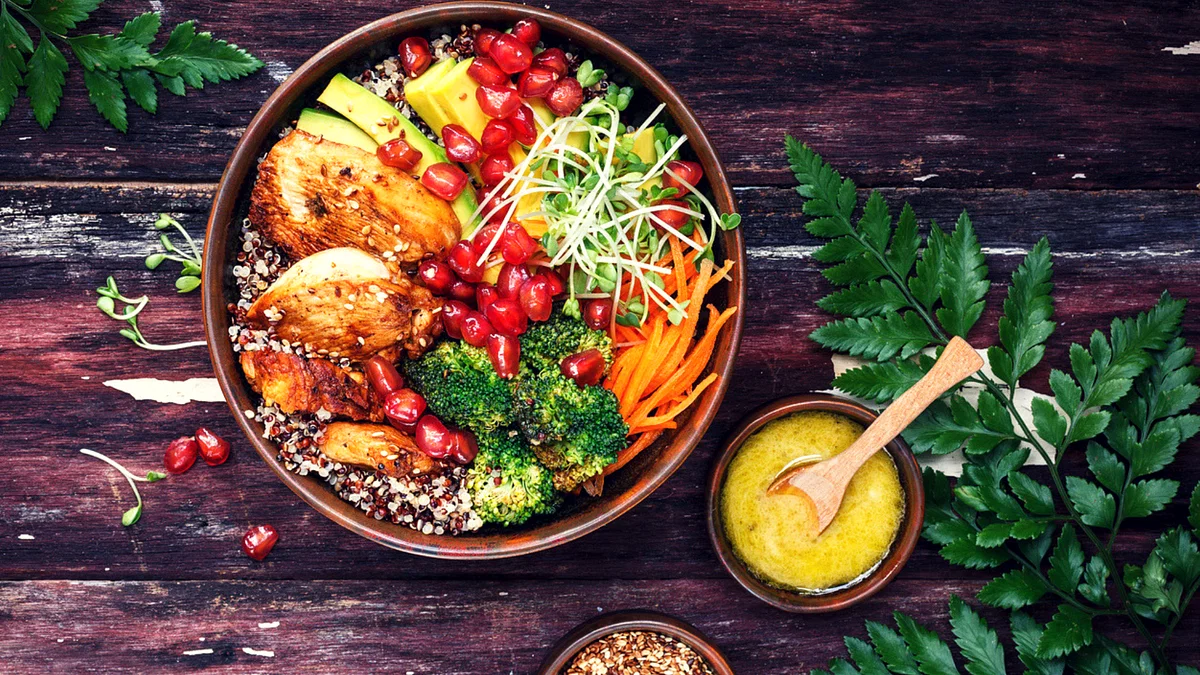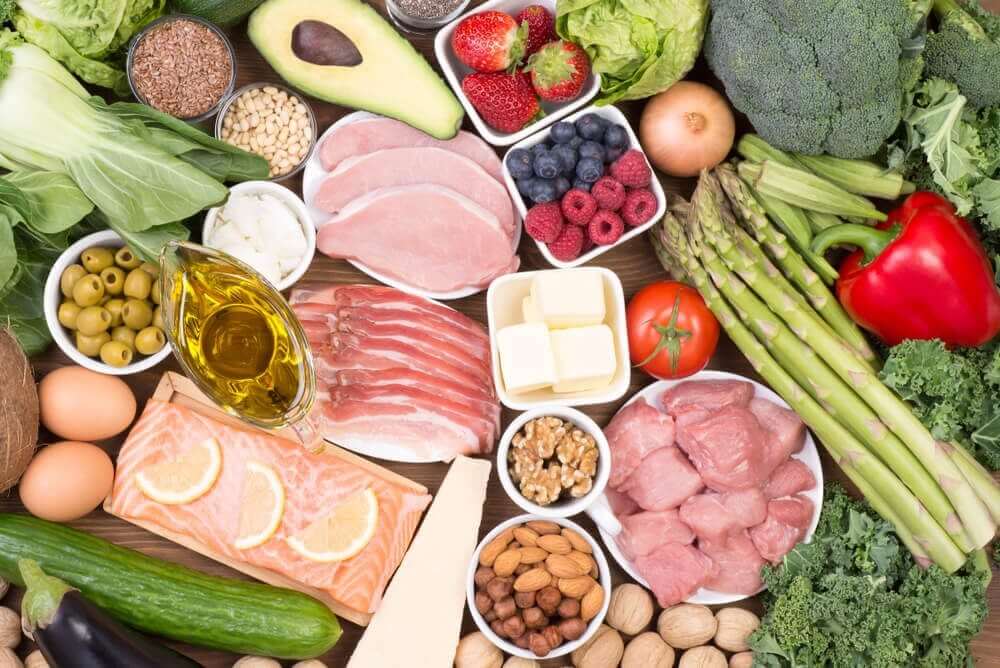HIGH-PROTEIN MEALS
High-protein meals have gained significant attention for their role in supporting weight management, muscle development, and overall health. Protein is an essential macronutrient that plays a crucial role in various bodily functions, including tissue repair, hormone production, and immune system function. High-protein meals are designed to prioritize protein-rich foods while keeping carbohydrate and fat intake in balance. By incorporating ample protein into your diet, you can enhance feelings of fullness, boost metabolism, and support lean muscle mass.
High-protein meals offer numerous benefits, such as increased satiety, improved body composition, and enhanced recovery after exercise. They can also be an effective component of weight loss or maintenance plans, as protein has a higher thermic effect, meaning it requires more energy to digest, metabolize, and utilize compared to carbohydrates and fats. Additionally, high-protein meals can aid in blood sugar regulation and contribute to better overall metabolic health.

HIGH-PROTEIN MEALS- WHICH FOOD GROUPS TO USE
When preparing high-protein meals, incorporating foods from various sources is essential to ensure a balanced and nutritious diet. Here are the main food ingredients and food groups commonly used when preparing high-protein meals:
- Lean Animal Proteins: Lean animal proteins are rich in high-quality protein and can include options such as skinless poultry (chicken, turkey), lean cuts of beef (sirloin, tenderloin), pork tenderloin, fish (salmon, tuna, cod), and seafood (shrimp, scallops). These protein sources provide essential amino acids and important nutrients like iron and zinc.
- Plant-Based Proteins: Plant-based protein sources are excellent choices for individuals following a vegetarian or vegan diet or those seeking alternative protein options. Examples include legumes (beans, lentils, chickpeas), tofu, tempeh, edamame, seitan, quinoa, and plant-based protein powders. Combining different plant-based proteins can ensure a complete amino acid profile.
- Eggs and Egg Whites: Eggs are a versatile and cost-effective source of protein. Whether consuming whole eggs or just the whites, they provide high-quality protein, essential vitamins, and minerals. Eggs can be used in various dishes, such as omelets, frittatas, or egg-based casseroles.
- Dairy and Dairy Alternatives: Dairy products such as Greek yogurt, cottage cheese, and low-fat milk are excellent sources of protein. They also provide calcium, vitamin D, and other essential nutrients. For those who are lactose intolerant or follow a plant-based diet, alternatives like almond milk, soy milk, and tofu-based products can be used.
- Nuts and Seeds: While also sources of healthy fats, nuts and seeds offer protein content. Almonds, walnuts, peanuts, chia seeds, flaxseeds, and hemp seeds are rich in protein and can be incorporated into meals, salads, or used as toppings for added texture and nutritional benefits.
- Quinoa and Whole Grains: Quinoa is a unique plant-based protein source that contains all essential amino acids. Additionally, whole grains like brown rice, barley, and whole wheat products provide a moderate amount of protein and can be used as a base for high-protein meals.
- Vegetables and Legumes: While not as protein-dense as animal or plant-based protein sources, vegetables and legumes contribute to the overall protein content of meals. Incorporate vegetables like spinach, broccoli, peas, and Brussels sprouts, as well as legumes like lentils and chickpeas, to boost protein and fiber intake.
Remember to combine protein-rich ingredients with other components of a balanced meal, such as non-starchy vegetables, healthy fats (like avocado, olive oil, or nuts), and complex carbohydrates (like whole grains or sweet potatoes), to create a well-rounded and nutritious high-protein meal. The exact food choices and portions may vary based on individual dietary preferences, restrictions, and health goals. Consulting with a healthcare professional or registered dietitian can provide personalized guidance tailored to your specific needs.

HIGH-PROTEIN MEALS SIDE EFFECTS
While high-protein meals offer numerous benefits, consuming an excessive amount of protein or relying solely on high-protein meals may lead to certain side effects. It’s important to maintain a balanced diet and consider potential drawbacks. Here are some possible side effects:
- Kidney Strain: Consuming extremely high levels of protein over an extended period can strain the kidneys, particularly in individuals with pre-existing kidney conditions. This is of greater concern for those with compromised kidney function. It is advisable to consume protein within recommended guidelines and consult with a healthcare professional if you have any kidney-related concerns.
- Digestive Issues: A sudden increase in protein intake may lead to digestive discomfort, such as bloating, gas, or constipation. It is important to gradually increase protein consumption and ensure sufficient fiber intake from vegetables, whole grains, and other fiber-rich foods to support healthy digestion.
- Nutritional Imbalances: Relying solely on high-protein meals may result in inadequate intake of other essential nutrients, such as carbohydrates, healthy fats, vitamins, and minerals. It is crucial to maintain a balanced diet by incorporating a variety of nutrient-rich foods.
- Increased Risk of Chronic Diseases: High-protein meals that primarily consist of animal-based proteins and neglect plant-based options may lead to an imbalance in nutrient intake. Consuming excessive amounts of animal proteins, particularly processed or red meats, has been associated with a higher risk of certain chronic diseases, including heart disease, certain cancers, and mortality. Balancing protein sources and opting for leaner animal proteins, plant-based proteins, and fish can help mitigate this risk.
- Dehydration: High-protein diets can have a diuretic effect, increasing water loss through urine. This can potentially lead to dehydration if fluid intake is not adequately increased. It is important to maintain proper hydration by drinking plenty of water throughout the day.
- Nutrient Excretion: Excess protein consumption may result in the excretion of calcium, leading to potential bone health concerns. Adequate intake of calcium-rich foods, such as dairy products or fortified plant-based alternatives, can help offset this effect.
- Weight Gain: While high-protein meals can support weight management, consuming excessive calories from protein-rich foods without proper portion control can lead to weight gain. It’s important to consider overall calorie balance and mindful eating to achieve desired weight management goals.
It’s crucial to maintain moderation, balance, and variety in your diet. Individual protein needs can vary based on factors such as age, sex, activity level, and overall health. Consulting with a healthcare professional or registered dietitian can provide personalized guidance and help ensure a well-rounded approach to protein consumption while addressing any specific concerns.
DIETS
Keto diet
Paleo diet
Cambridge diet
Diabetic diet
MEALS
Plant-based
Meat meals
Carbs meals
Diabetic meals
HEALTH
Benefits
Blood pressure
Reverse diabetes
Nutrition
EXTRAS
News
Blog
About Us
Contact Us

